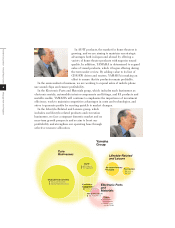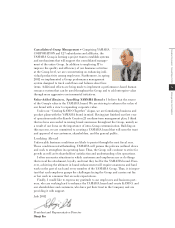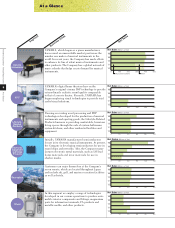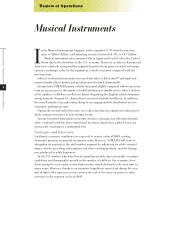Yamaha 2002 Annual Report Download - page 4
Download and view the complete annual report
Please find page 4 of the 2002 Yamaha annual report below. You can navigate through the pages in the report by either clicking on the pages listed below, or by using the keyword search tool below to find specific information within the annual report.
In fiscal 2002, ended March 31, 2002, domestic private-sector investment
in capital and housing decreased, personal consumption remained weak, and
the global economy continued to stagnate. Due to these and other factors, the
YAMAHA Group continued to face extremely harsh business conditions, which
adversely impacted sales growth. In particular, decreased production of information
technology (IT) products containing semiconductors, weak consumer confidence
accompanying the disposal of bad debt, and the deceleration of the U.S. economy,
which coincided with the occurrence of several terrorist attacks, all contributed to
heightened concern regarding future business prospects and exerted downward
pressure on individual consumption. Meanwhile, the Group’s operating environment
continued to see ongoing change, including the rapid proliferation of broadband
and mobile communications and the strong development of the Chinese economy.
Fiscal 2002 Business Performance
In the midst of this operating environment, although consolidated net sales benefited
from the weak yen prevailing during the term, sales growth faltered in Japan, the
United States, and other regions, declining 2.8% from the previous term, to ¥504.4 bil-
lion. A closer look at various products reveals a decline in income from the sale of
musical instruments—a segment to which YAMAHA CORPORATION is devoting much
attention—and lower sales in such product areas as electronic metals and information
and telecommunications devices (CDR-RW drives, routers, and other products). How-
ever, there were several areas in which the Company recorded year-on-year sales increas-
es, in particular, its home theater product and mobile phone related businesses, which
include a ringing melody distribution service and operations producing sound chips
used to generate mobile phone ringing melodies.
In addition to recording lower sales and despite recording gains on foreign exchange,
cutbacks in manufacturing output and sales prices in order to reduce inventories caused
the Company’s gross profit ratio to worsen. Despite this, although operating income
was down 52.0% compared with the previous term, we expect positive results from the
drastic inventory reduction carried out during the term to manifest in fiscal 2003.
Furthermore, as the value of our shareholdings of bank and other stock declined dur-
ing the term, we recorded a ¥14.9 billion loss on devaluation of investment securities.
YAMAHA recorded a ¥10.3 billion net loss for the term.
To ensure an accurate valuation of our assets and a transparent balance sheet, we
carried out a revaluation of the Group’s main real estate assets based on valuation
amounts used for the appraisal of municipal property taxes.
To some extent, our business confidence has been dented by external factors, but
we have tried to stop such factors from adversely affecting our business performance,
paying particular attention to the reformation of business units whose profitability has
fallen. To this end, we will strengthen our management strategy, which is based on
Kando Creation 21, our medium-term management plan covering the three fiscal
years in the period ending March 31, 2004.
Yamaha Corporation Annual Report 2002 Message from the President
2
Message from the President

















